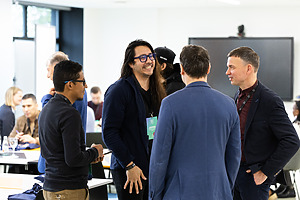KTU community participates in more than 70 academic networks
At the end of 2024, in order to strengthen the university’s international visibility and to strategically develop participation in academic networks, a new function was launched within the Academic Mobility and Networks Division of the International Relations Department. This function is dedicated to coordinating international academic networking.
One of the first steps in this area was gathering information about KTU community participation in international academic networks (IANs).
“The results were pleasantly surprising – it turned out that international networking is really extensive. Before this analysis, knowledge of the KTU community’s participation in IANs was limited and fragmented, but now we can see clear numbers, areas of activity, and the most actively involved university units,” shares Gintarė Vilbikienė, Head of the Academic Mobility and Networking Unit.
The collected data revealed that members of the KTU community are currently involved in more than seventy International Academic Networks. Based on the available data, all faculties of the university, the International Relations Department, science institutes, the Doctoral School, and the KTU Lifelong Learning Centre are engaged in networking.
It is important to note that KTU representatives not only participate but also hold leadership roles in these networks, helping to shape their strategic directions. This significantly enhances the University’s visibility on the international stage.
Students benefit from networking activities
More than sixty networks focus on specialised fields aligned with KTU faculties, ranging from engineering and technology to business and environmental science. These platforms enable international knowledge exchange, the improvement of methodologies, and the development of professional competencies.
Other networks address broader issues such as higher education policy, continuing education, and innovation.
Some of these networks stem from Lithuania’s membership in international organisations (e.g., NATO, CERN, or the UN), while others are affiliated with national-level organisations (e.g., EuChemS, Eurelectric, IAEE). Participation in sustainability-focused networks, such as BUP and COPERNICUS Alliance, is also important. Sustainability topics are addressed in thematic groups and conferences of other networks such as SEFI and NORDTEK.
Students also play a key role in international academic networking activities. They are invited to attend training sessions, conferences, and competitions, and they can submit publications and receive mobility support. KTU also hosts student chapters of several networks (e.g., Optica, IEEE). These initiatives often originate from community involvement and include responsibilities and active engagement in network activities.
Looking ahead
“The analysis shows that we have a lot of untapped potential. For example, some thematic network topics are relevant to several or even all KTU units, so the involvement of the university community could be significantly increased,” notes Rūta Jankauskienė, Coordinator of International Networks.
More strategic focus will be placed on international networking in the future, along with efforts to better inform the university community about the opportunities these networks offer. Support will also be provided to KTU community members engaged in international networking activities, to further specific areas of collaboration and elevate the university’s image both in Lithuania and internationally.
“We have identified two main objectives to create added value for KTU through networking: to promote participation across various interdisciplinary and thematic areas, and to expand the competencies, knowledge, and resources of staff and students. This is the path to enhancing the University’s visibility and prestige,” adds Šadeikaitė-Gjorsheski.
If you have any suggestions or requests regarding international academic networking, please contact Rūta Jankauskienė (ruta.jankauskiene@ktu.lt), Coordinator of International Networks, to explore possibilities for further cooperation.



